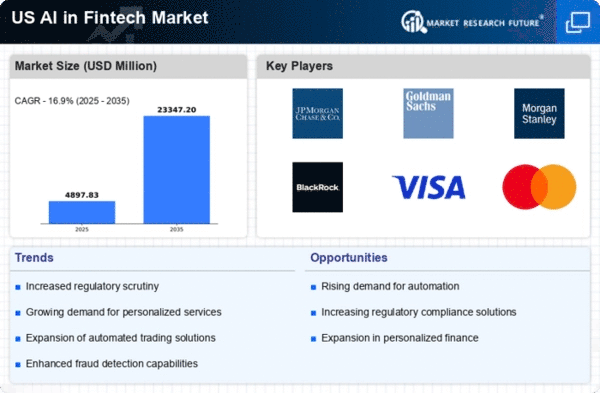Fraud Detection and Prevention
Fraud remains a persistent challenge in the financial sector, driving the demand for advanced AI solutions in the ai in-fintech market. AI technologies are being employed to detect and prevent fraudulent activities by analyzing transaction patterns and identifying anomalies in real-time. The financial industry is projected to allocate over $10 billion annually towards fraud prevention technologies by 2026. This investment underscores the critical importance of AI in safeguarding financial transactions and maintaining consumer trust. As fraud tactics evolve, the ai in-fintech market is expected to expand, with a focus on developing more sophisticated detection algorithms.
Regulatory Compliance and Adaptation
The ai in-fintech market is experiencing a surge in demand for solutions that ensure compliance with evolving regulations. Financial institutions are increasingly required to adhere to stringent guidelines, which necessitates the integration of advanced AI technologies. These technologies can analyze vast amounts of data to identify compliance risks and automate reporting processes. In 2025, it is estimated that compliance-related expenditures in the financial sector will reach approximately $20 billion, highlighting the critical role of AI in facilitating adherence to regulations. As regulatory frameworks continue to evolve, the ai in-fintech market is likely to see sustained growth driven by the need for innovative compliance solutions.
Enhanced Customer Insights and Analytics
In the ai in-fintech market, the ability to derive actionable insights from customer data is becoming paramount. Financial institutions are leveraging AI to analyze customer behavior, preferences, and transaction patterns. This analytical capability enables firms to tailor their offerings and improve customer engagement. According to recent studies, organizations utilizing AI-driven analytics have reported a 30% increase in customer satisfaction. As competition intensifies, the demand for sophisticated analytics tools is expected to rise, propelling the growth of the ai in-fintech market. The focus on customer-centric strategies is likely to drive innovation and investment in AI technologies.
Cost Efficiency and Operational Optimization
The pursuit of cost efficiency is a significant driver in the ai in-fintech market. Financial institutions are increasingly adopting AI solutions to streamline operations and reduce overhead costs. By automating routine tasks, such as data entry and transaction processing, organizations can allocate resources more effectively. It is projected that AI implementation could lead to a reduction in operational costs by up to 25% over the next few years. This potential for cost savings is compelling financial institutions to invest in AI technologies, thereby fostering growth in the ai in-fintech market. The emphasis on operational optimization is likely to shape the future landscape of financial services.
Integration of Blockchain and AI Technologies
The convergence of blockchain and AI technologies is emerging as a transformative driver in the ai in-fintech market. Blockchain offers enhanced security and transparency, while AI provides advanced analytical capabilities. This integration is likely to facilitate more secure transactions and improve data integrity. Financial institutions are exploring the potential of combining these technologies to enhance operational efficiency and reduce fraud. It is anticipated that the market for blockchain in conjunction with AI will grow significantly, with projections indicating a potential market size of $5 billion by 2027. This synergy is expected to redefine the operational landscape of the ai in-fintech market.
















